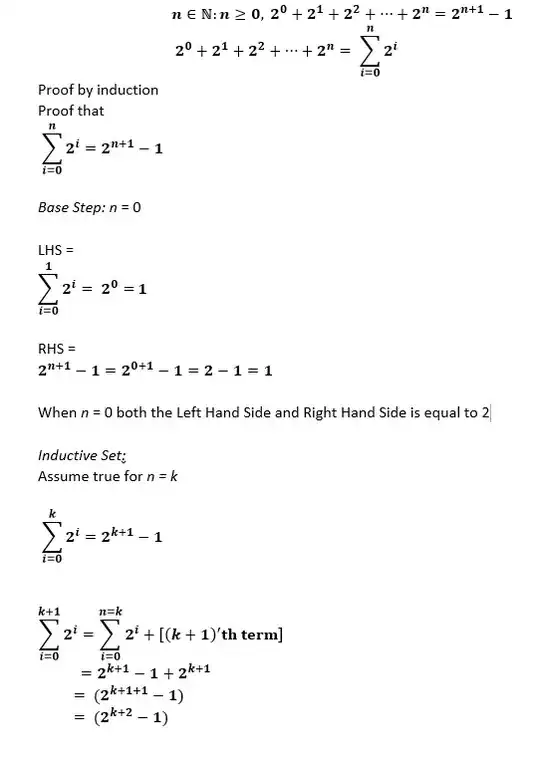How do I know what I need to show?
This comment makes it sound like you do not really understand what all goes into proving something by induction, and that is perfectly fine--induction is a very tricky proof technique if you do not have much experience with it or are simply encountering it for the first time. Per Alexandre's comment, you may find this post helpful for writing up your induction proofs in the future (note how my proof below is reflective of the template offered in that post), but I would encourage you to read this post first because it explains why mathematical induction is a valid proof technique. Until you understand why induction is valid, you cannot reasonably expect to be able to "know what you need to show." That being said, please do read the two posts linked to above and then read my proof below to see if it makes sense. If you have a question(s) about any step(s) after reading those posts and my proof, then simply let me know.
Problem: Prove that $\sum_{i=0}^n 2^i = 2^{n+1}-1$ for all $n\geq 0$.
Solution: For any integer $n\geq 0$, let $S(n)$ denote the statement
$$
S(n) : \sum_{i=0}^n 2^i = 2^{n+1}-1.
$$
Base step ($n=0$): $S(0)$ says that $\sum_{i=0}^0 2^i = 2^0 = 1 = 2^{0+1}-1$, and this is true.
Inductive step $S(k)\to S(k+1)$: Fix some $k\geq 0$. Assume that
$$
S(k) : \color{blue}{\sum_{i=0}^k 2^i = 2^{k+1}-1}
$$
holds ($S(k)$ is called the inductive hypothesis). To be proved (i.e., "what you need to show") is that
$$
S(k+1) : \color{green}{\sum_{i=0}^{k+1} 2^i = 2^{k+2}-1}
$$
follows. Beginning with the left-hand side of $S(k+1)$,
\begin{align}
\color{green}{\sum_{i=0}^{k+1} 2^i} &= \color{blue}{\sum_{i=0}^k 2^i}+2^{k+1}\tag{by defn. of $\Sigma$}\\[1em]
&= \color{blue}{(2^{k+1}-1)}+2^{k+1}\tag{by $S(k)$, the ind. hyp.}\\[1em]
&= 2\cdot2^{k+1}-1\tag{simplify}\\[1em]
&= \color{green}{2^{k+2}-1},
\end{align}
one arrives at the right-hand side of $S(k+1)$, thereby showing $S(k+1)$ is also true, completing the inductive step.
Conclusion: By mathematical induction, it is proved that for all $n\geq 0$, the statement $S(n)$ is true. $\Box$
